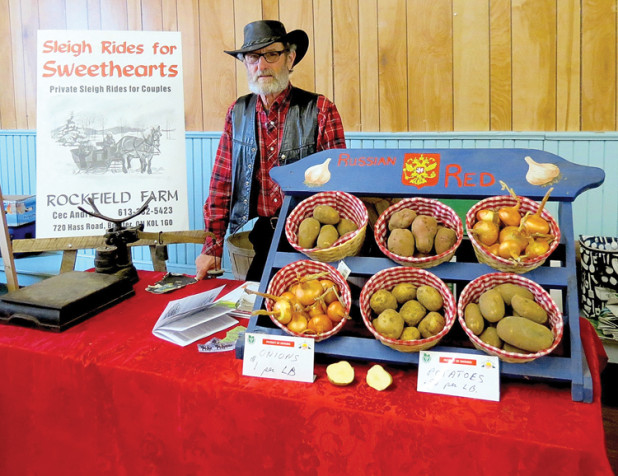Headline News
Heirloom seeds exchanged in Maynooth
March 10, 2016

Cec Andrus, from Rockfield Farm in Boulter, participated in Seedy Saturday, on March 5, at the Old Community Centre in Maynooth. Andrus has recently acquired a cozy new sleigh and has expanded his deliverables to include romantic horse drawn couples excursions, featuring Carlow Mayo’s breathtaking vistas. SARAH VANCE Special to This Week
By Sarah Vance
It has been seven years since a small group of friends started the conversation that would lead to an heirloom seed exchange in Maynooth.
“Tom and Natalie and I were thinking of attending one, when we realized that between us and friends, we had a lot of seeds to share. So we put out the word and a few weeks later we had a potluck and exchange in the Sun Run Greenhouse,” said Brian Sharpe, an organizer of Seedy Saturday, which happened over the weekend at the Old Community Centre.
Over the years, their determination has brought measurable gains in Hastings Highlands, including a seed library, an eager team of vendors and a growing network of farmers.
“Now Seedy Saturday pretty much runs itself,” said Sharpe, amongst the vendors who made the trek from areas like Boulter, Madoc and Peterborough to share their seeds on Saturday. “People now anticipate it.”
Over the years the exchange has provided opportunities to highlight the importance of indigenous heirloom seeds. These seeds have not been modified by human activity and they continue to be pollinated naturally by bees. Heirloom produce grown from seeds, passed down from generation to generation, bears the colours and textures that naturally occur in a plant.
“For example, carrots were never orange,” said Diane Dorion in an interview with Bancroft This Week. A farmer whose blogs about the area have been published by the National Post, Dorion has found local farmers to be ahead of the game when it comes to sustainable practices. “Carrots were white, purple, and yellow, but have been genetically modified to be orange.”
Keeping heirloom seeds in circulation, exchanges like the one in Maynooth promote environmental stewardship, by giving people the tools they need to keep their food supply local.
The Hastings County Economic Development Office has noted trends in agriculture that favour indigenous produce introduced by early settlers, many of whom emigrated from Prussia.
“Over the past few years I’ve witnessed a demand for locally produced, fresh and healthy food. This pushes interest in farmers’ markets and events like Seedy Saturday, providing an opportunity for producers and consumers to connect,” said Andrew Redden. “It’s nice to establish a relationship with the person producing the food we eat, and we feel better knowing that we are supporting a local producer.”
“Regional organizations like Harvest Hastings promote, educate and market local farmers, making it easier for a farmer to find customers,” said Dorion. “When I moved out of the area, I had to do a lot more advertising and branding myself.”
“Hastings County has a high proportion of employment in agriculture and related activities, in contrast to Ontario as a whole,” said Redden. “While the 2001 Census of Agriculture reported fewer farms than in 2006, there are many smaller scale and artisan-type agricultural operations starting up.”
Cedar Grove Organic Farm from Omemee had the last of their season’s potatoes on-hand, with Railway Creek Farms in Madoc bringing garlic bulbs on the cusp of sprouting. A new deliverable by the Ontario Biodynamic Society, a seed planting calendar, was also available at the sustainable rural seed exchange. The exchange is promoted by vibrant poster campaigns and an active Facebook page.
“We pay for the hall, materials, promotions and the insurance now as well,” said Sharpe. “The Maynooth Business Association and Sun Run Cafe play a role as do donations at the door and the vendor presence.”
After another successful event, it was clear that Seedy Saturday has definitely taken root.

















